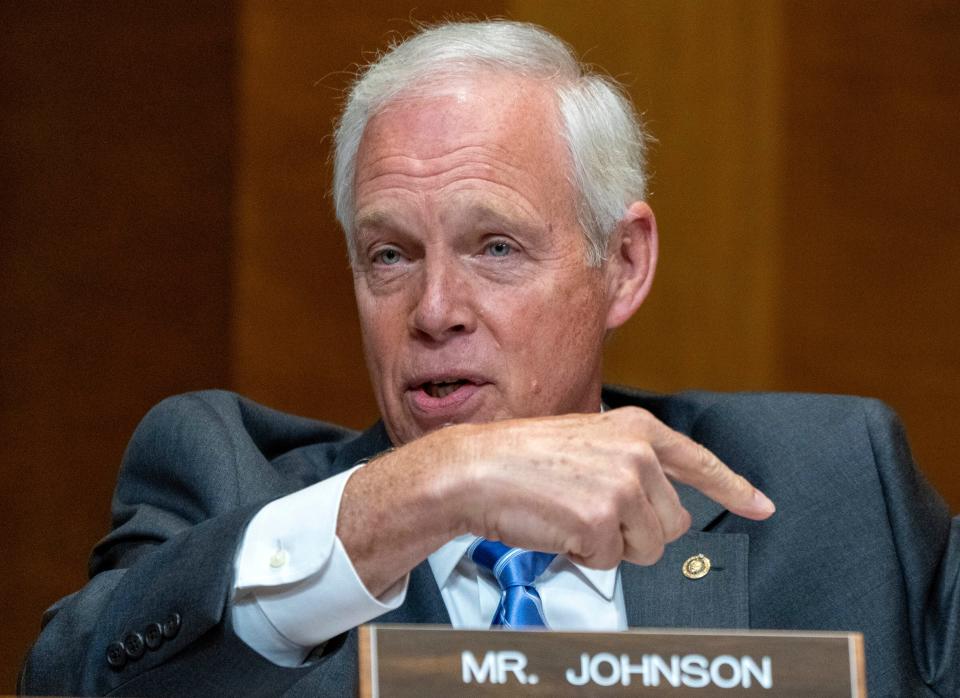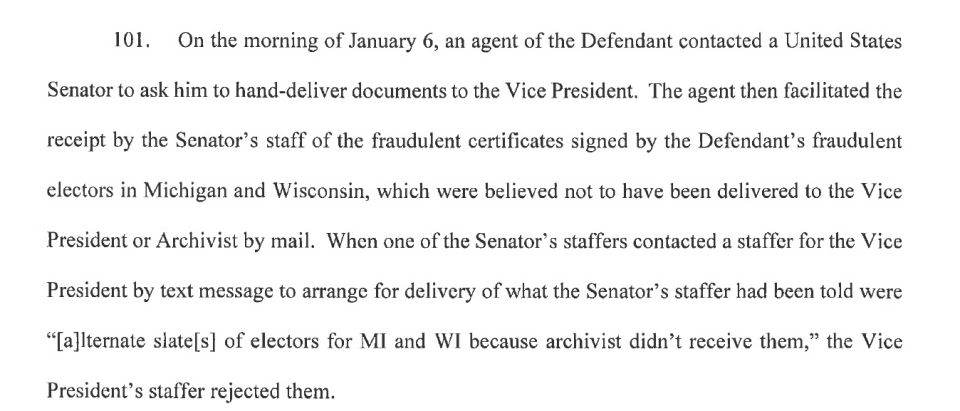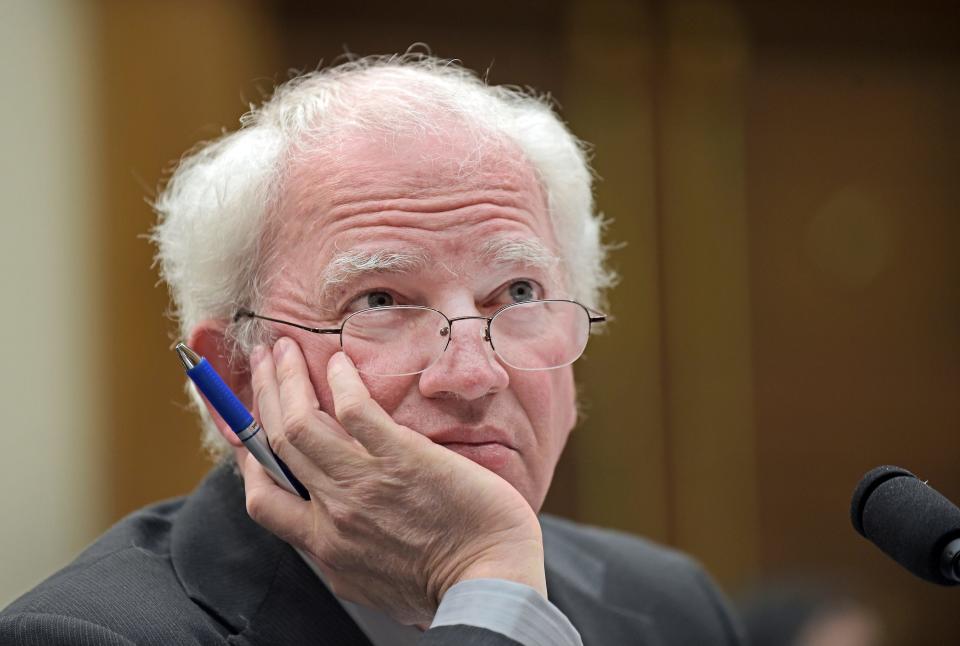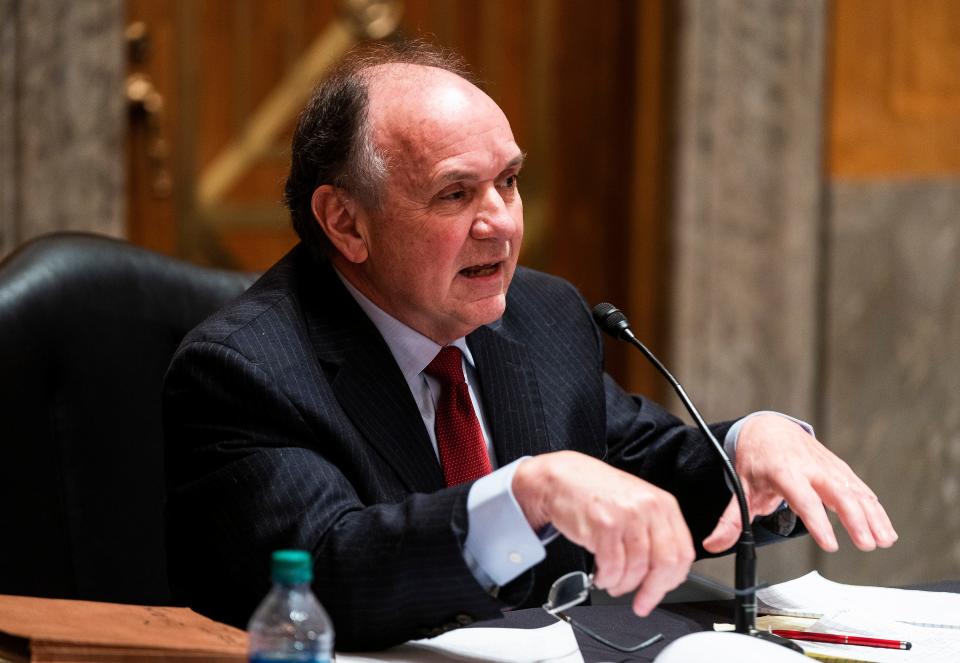Here are the ways Ron Johnson, others with Wisconsin ties appear in the Trump Jan. 6 indictment
- Oops!Something went wrong.Please try again later.
- Oops!Something went wrong.Please try again later.
- Oops!Something went wrong.Please try again later.
MADISON – The plot alleged by federal investigators to ignore the results of the 2020 presidential election and keep Donald Trump in power hinged on slates of Republicans in battleground states like Wisconsin claiming to be electors for Trump. But the indictment of Trump also includes a cast of other characters with Wisconsin ties involved in the events leading up to the Jan. 6, 2021, attack at the U.S. Capitol.
Among them are Wisconsin's senior U.S. senator, a former Dane County judge and an attorney who flew to Wisconsin just last year in an attempt to persuade Assembly Speaker Robin Vos to overturn the results of the 2020 election.
Here is the list of people who appear in Trump's indictment with Wisconsin ties:
U.S. Sen. Ron Johnson

Paragraph 101 of the indictment outlines U.S. Ron Johnson's involvement in a failed attempt to hand slates of false electors to Vice President Mike Pence on Jan. 6.
About 20 minutes before a joint session of Congress was set to convene to begin certification of Biden’s victory that day, Johnson chief of staff Sean Riley told a staffer for Pence that Johnson wanted to hand-deliver to Pence votes from Republicans in Wisconsin and Michigan who posed as fake presidential electors for Trump.
"Johnson needs to hand something to VPOTUS please advise," Riley texted Pence staffer Chris Hodgson at 12:37 p.m. that day, according to evidence presented Tuesday by the House select committee investigating the attack on the U.S. Capitol.
"What is it?" Hodgson, a former legislative affairs director for Pence, replied.
"Alternate slate of electors for MI and WI because archivist didn't receive them," Riley wrote back.
Hodgson then told Riley: "Do not give that to him."
“On the morning of January 6, an agent of the Defendant (Trump) contacted a United States Senator to ask him to hand-deliver documents to the Vice President. The agent then facilitated the receipt by the Senator’s staff of the fraudulent certificates signed by the Defendant’s fraudulent electors in Michigan and Wisconsin, which were believed not to have been delivered to the Vice President or Archivist by mail,” the indictment reads, noting that Pence’s staffer rejected the documents.

Johnson has downplayed the exchange as a “staff to staff” conversation and has said his involvement lasted just seconds.
“My involvement in that attempt to deliver spanned the course of a couple seconds,” Johnson told WISN-TV’s Matt Smith in August 2022. “I think I fielded three texts and sent two and talked to my chief of staff that somebody wants you to deliver something.”
Johnson initially claimed to be "basically unaware" of an effort by his staff to get the fake presidential elector documents to Pence and later said he coordinated with Jim Troupis, a former Dane County judge and Trump campaign attorney, to pass along such information and alleged a Pennsylvania congressman brought the slates of fake electors to his office — a claim that was immediately disputed.
Johnson also initially told reporters he did not know where the documents came from and that his staff sought to forward it to Pence.
More: Here are the 10 people who participated in Wisconsin's fake elector scheme in 2020
John Eastman

“Co-Conspirator 2” in the indictment is John Eastman, an attorney who designed the strategy to "leverage the Vice President’s ceremonial role overseeing the certification proceeding to obstruct the certification of the presidential election."
Eastman also traveled to Wisconsin in 2022 to meet with Assembly Speaker Robin Vos in an ultimately unsuccessful attempt to persuade Vos to take action to overturn the 2020 result, which was impossible and illegal.
"This man tried to save our country single-handedly on Jan. 5 and 6 (2021), when he advised the administration, who was still the president of the United States, that they didn't have to do what happened on Jan. 6," Jefferson Davis, a former village president of Menomonee Falls who has launched an effort to persuade lawmakers to undo the 2020 election, said during the March 2022 meeting in the state Capitol with Eastman.
Eastman was key to a movement in Wisconsin to decertify the election, support for which has waned since. In December 2021, Eastman wrote an eight-page memo for former state Rep. Tim Ramthun, a Campbellsport Republican who ran for governor on a platform of decertification.
Eastman's memo concluded the election results could be considered void if voting laws were broken. A number of conservative attorneys and a host of legal scholars reached the opposite conclusion, saying there is no way to reverse an election that had been held a year and a half prior.
More than three dozen county Republican Party chapters in Wisconsin at one point had passed resolutions calling for decertification.
Eastman visited the Capitol on March 16, 2022, to meet with Vos. Afterward, Eastman participated in a news conference to argue lawmakers could decertify the election because the state used voting mechanisms that he considered illegal. Courts have broadly upheld the way Wisconsin conducted the 2020 election.
"None of that was legal and the number of ballots that were affected by that illegality was much greater than the margin,” Eastman said at the time. “The Wisconsin Legislature, therefore, in my view, not just up until Jan. 6 (2021), or inauguration, but today as well, has the ability to look at the assessment and say, you know, our election was illegally certified.”
Vos, however, stood by the fact that the state’s 10 electoral votes could not be rescinded.
Kenneth Chesebro
The man listed as "Co-Conspirator 5" is an attorney who described himself as a "Wisconsin native" on his LinkedIn page and is accused of assisting in "devising and attempting to implement a plan to submit fraudulent slates of presidential electors to obstruct the certification proceeding.”
Chesebro sent a memo on Nov. 18, 2020, to Troupis, the Wisconsin attorney hired by Trump's campaign to oversee recounts in the state. In that memo, he drafted a plan to establish Republican electors in Wisconsin and other states contested by the Trump campaign.
Chesebro told Troupis that Jan. 6, 2021, was the "real deadline" to resolve Wisconsin's presidential contest — not Dec. 8, 2020, a "safe harbor" deadline under the Electoral Count Act that Wisconsin missed, or Dec. 14, 2020, when electors met in the Wisconsin State Capitol to confirm President Joe Biden's victory.
"Assuming the electors pledged to Trump and Pence end up meeting at the Wisconsin Capitol on December 14 to cast their votes, and then send their votes to the President of the Senate in time to be opened on January 6, a court decision (or, perhaps, a state legislative determination) rendered after December 14 in favor of the Trump-Pence slate of electors should be considered timely," Chesebro wrote.
Jim Troupis

While not explicitly discussed in the indictment, the former Dane County judge and Trump campaign attorney was one of the first to receive the memo from Chesebro that outlined the fake elector strategy that is central to the indictment.
The memo to Troupis came from Chesebro with the subject line "The Real Deadline for Settling a State’s Electoral Vote."
It outlined Chesebro's legal analysis backing up his suggestion during a conference call with Troupis that "in any judicial review of the canvassing/recounting in Wisconsin, we should emphasize that the presidential election timetable affords ample time for judicial proceedings, even if initial errors in the recount require a remand for further recounting."
Troupis received the memo the same day he filed paperwork on behalf of the Trump campaign to begin ballot recounts in the liberal-leaning and populous Dane and Milwaukee counties.
The memo to Troupis was used by Trump attorney Rudy Giuliani, who is named as Co-Conspirator 1 in the indictment, and others to develop a strategy to "exploit ambiguities in the Electoral Count Act."
During the recounts of Dane and Milwaukee counties, Troupis sought to throw out tens of thousands of absentee ballots that were cast in person — an argument that included tossing his own ballot, and his wife's.
Troupis and his wife voted early using the state's in-person absentee option — one of a group of voters whose ballots the Trump campaign unsuccessfully asked election officials to deem illegal.
Troupis also contacted U.S. Sen. Ron Johnson to get to Pence a document on Jan. 6, 2021 Troupis described as regarding "Wisconsin electors."
Johnson said Troupis contacted him by text message and then introduced the attorney to his chief of staff also by text message to handle the request. He said he did not know what the document was or intended to accomplish.
Molly Beck can be reached at molly.beck@jrn.com.
This article originally appeared on Milwaukee Journal Sentinel: Ron Johnson, others with Wisconsin ties appear in the Trump indictment

